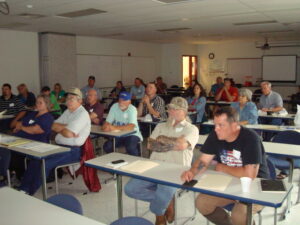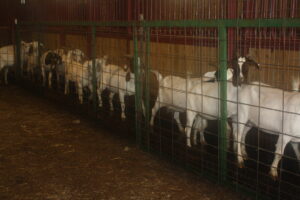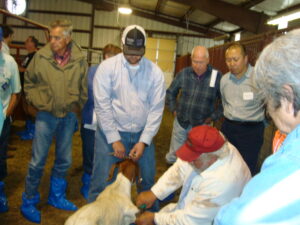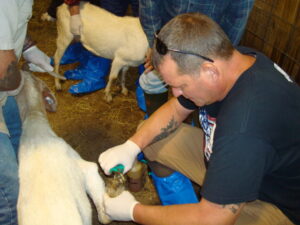2015 Annual Report for LNC14-363
Detection and Prevention of Footrot Outbreak in Sheep and Goats
Summary
Footrot is an extremely contagious disease and there is no effective vaccine available for small ruminants. This program has integrated preventive education, demonstration, and training in an effort to reduce footrot outbreaks among domestic ruminants and wild species. Achieved milestones for the project duration have enhanced small ruminant producers’ skills and knowledge significantly for on-farm detection, prevention, and diagnosis of footrot disease outbreaks.
Objectives/Performance Targets
The main objective is to organize farmers’ and producers’ training workshops for topics of small ruminant animal welfare, foot and hoof care, and demonstrate footrot prevention, treatment, and on-farm biosecurity protocol.
Accomplishments/Milestones
The accomplished milestones have enhanced producers’ skills and knowledge of the applicable new techniques for on-farm detection, diagnosis, and prevention of footrot outbreaks.
- Organized farmers’ and producers’ training workshop. Project Directors and invited speakers have presented five seminar lectures at the workshop – “Detection and prevention of footrot outbreak in sheep and goats” for farmers, agriculture teachers, students, and trainees. These topics were presented by Dr. Tumen Wuliji (Footrot and hoof diseases of small ruminants); Dr. Tumen Wuliji and Dr. Borjihan Hasibagan (Detection and prevention of footrot outbreak in sheep and goats); Dr. Jodie Pennington (Foot and hoof care, nutrition and grazing management of small ruminants); Dr. Delinda Volskay (Animal health, welfare and medication in small ruminants); and Mr. Jay Wilkins (Hoof trimming, foot bathing, footrot diagnosis, control and management in small ruminants), respectively. The workshop and field day was announced six weeks in advance via sheep and goat producers association, farming newsletters, and participants’ websites. Ninety-eight correspondents had expressed their interests to participate in the workshop through a small ruminant footrot prevalence status survey. Forty-five people attended the training workshop including three high school agricultural science teachers/farmers, and six students from Crowder College. All producer-participants have completed the workshop evaluation survey and feedback was positive.
- Organized a field demonstration with hands-on experience. The Crowder College farm manager demonstrated the techniques and procedures for participants on hoof trimming, footrot scoring, footbathing, animal health records, and farm biosecurity. Two sessions of hoof trimming, footrot scoring and footbathing workshop were run concurrently and repeated twice (a. Foot and hoof assessment scoring and trimming; b. Footbath prep and bathing) respectively. Eight wooden footbath troughs (with flat bottom), each measuring 4” D x 17”W x 144.5”L, were constructed at Crowder College Farm; one trough would provide a sufficient standing space for 6-8 goats. Footbath solution was made using Zinc Sulfate (Zinc 35.5% and Sulfur 16.5%) at 10% (w/v) in tap water. Small amount of wood shavings were added in troughs to reduce waste from animal movements. Wooden troughs were fixed along fences or pens for animals to walk through or stay in footbath solution for 30 min at weekly intervals for five weeks. The weekly footbath setup is open for observation by local farmers. Fifty-eight mixed age goats were assigned for hoof trimming and footbathing demonstration. Each participant trimmed one or two hooves and assessed for footrot scores with reference to a standard chart (score 0-4). The average footrot score for the goat flock was at score level two prior to footbath but was reduced to zero after two weekly footbath treatments. Scores remained at a zero at 6th week inspection.
- Conducted on-farm visitation, footrot field inspection, and diagnostic training. Project directors have visited more than twenty producers’ farms, which have a history of footrot cases, and provided training for diagnostic inspection, test samplings, and footrot outbreak monitoring.
- Conducted footrot lesion swabs, specimen sampling, culturing, and the pathogen identification. Four to ten footrot suspected animals from each of inspected farms were swabbed for foot/hoof lesions or necrosis for pathogenic culture and identification. These test results were provided to owners for any likely virulent infectious pathogens. Image 5
 Farmers, agricultural science teachers, and students participated training workshops
Farmers, agricultural science teachers, and students participated training workshops  Goats walk through footbath solution troughs
Goats walk through footbath solution troughs  Goat hoof trimming demonstration
Goat hoof trimming demonstration  Farmers conduct hoof trimming and footrot scoring
Farmers conduct hoof trimming and footrot scoring
Impacts and Contributions/Outcomes
The outcome of the project will directly benefit producers and trainees through their collaboration and hands-on experience in field detection, diagnostics, prevention, and management protocol for their farms. One FactSheet and one poster was presented at Lincoln University Science Day Forum.
Collaborators:
1770 S. Farm Road
Bois D'Ark, MO 65612
Office Phone: 4177322325
Assistant Professor
Lincoln University
110 SARF 1220 Chestnut Street
Jefferson City, MO 65101
Office Phone: 5756815381
Professor & Clinical Microbiologist
University of Missouri
Veterinary Medical Diagnostic Laboratory
1600 East Rollins
Columbia, MO 65211
Office Phone: 5738849259
Farmer
1105 N Main Street
Uptown Farm
Brookfield, MO 64628
Office Phone: 6605410468
Crowder College
601 Laclede Avenue
Neosho, MO 64850
Office Phone: 4174555648
Farmer
Ivy Sheep Company
10620 E Hwy K
Stockton, MO 65785
Office Phone: 4172761136
Farmer
5475 Audrain Road 133
Anvil C Ranch
Centralia, MO 65240
Office Phone: 5736821661
Region Small Ruminant Educator
Lincoln University
601 Laclede Avenue
Smith Hall, Crowder College
Neosho, MO 64850
Office Phone: 4174559500
4307 Gum Road
Reeds, MO 64859
Office Phone: 4173596940